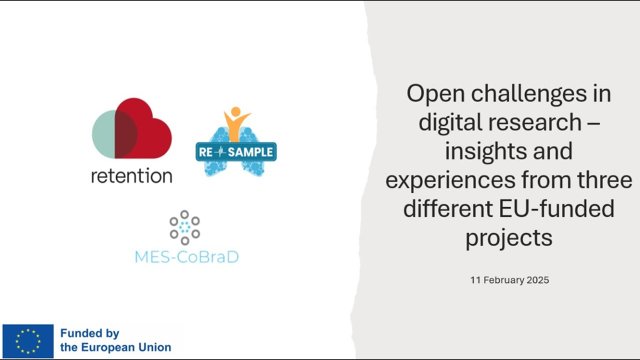On 11 February 2025, the RE-SAMPLE project organised a joint webinar with 2 sister projects, MES-CoBraD and RETENTION.
The webinar "Open challenges in digital research – insights and experiences from three different EU-funded projects" dealt with the ethical aspects of integrating AI into healthcare. It comprised three presentations:
- RE-SAMPLE: "Integrating a novel COPD and CCCs disease management solution into healthcare" by Serge Autexier (DFKI), Alice Luraschi (Fondazione Policlinico Universitario Agostino Gemelli IRCSS), and Agni Delvinioti (Fondazione Policlinico Universitario Agostino Gemelli IRCSS )
The RE-SAMPLE project aims to introduce a novel disease management process for COPD and CCCs through the introduction of shared decision-making, self-management concepts and explainable AI-based digital tools for personalised support for both patients and clinicians. A mobile application for patients and a clinical dashboard for clinicians enable daily disease monitoring and empower patients to cope with their conditions in an active way. The solution is currently deployed in three pilot hospitals in the Netherlands, Italy and Estonia.
Such an ambitious attempt comes along with several challenges in its implementation, regarding both technical and operative aspects. Technically speaking, data availability and harmonization require high effort from the participating hospitals in terms of data preparation and system integration. At the same time, clinicians need to undergo training and dedicate additional time in their daily duties to handle alerts as well as coaching sessions and follow up visits to provide the necessary data for model training. Finally, on a daily basis patients are requested to report their symptoms and to reach goals related to medication adherence and physical activity, as agreed with the clinicians during the shared decision-making sessions. All this additional workload, involving the several stakeholders participating in the project, resulted in several challenges in the implementation of the project’s components.
Nonetheless, the RE-SAMPLE consortium addressed most of the problems effectively, moving towards improved solutions to the challenges in an iterative way.
- RETENTION: "Harnessing AI for Heart Failure: Enhancing patient care through explainable and ethical AI in the RETENTION Project" by Mercedes Rivas Lasarte (SERMAS), Irina Nicolae (Siemens SRL), and Christina Nanou (Eunomia Ltd.)
This presentation delved into the multifaceted nature of heart failure (HF) and the complexities associated with the syndrome. It highlighted the pivotal role of artificial intelligence (AI) in enhancing patient characterisation and outlined the approach to integrating AI within the Retention project. Emphasis was placed on the collaborative design of AI, and the challenges of explainable AI (XAI) in the healthcare context. The presentation discussed the challenges of how AI can be made transparent and understandable for clinicians, ensuring they not only know how to use it but also comprehend its workings.
Finally, the presentation explored the ethical considerations and regulatory frameworks pertinent to AI, with a focus on explainability in the RETENTION project. It discussed the importance of incorporating explainability from the outset, the challenges encountered, and the solutions proposed. The presentation highlighted the significance of explainability and ethical AI development, emphasising the need for customised and collaborative ethics assessment processes that will assist with the integration of ethics into AI development, as well as with raising awareness and providing solutions to the challenges faced.
- MES-CoBraD: "At the intersection of medical ethics and AI ethics: The MES-CoBraD’s ETHAI model" by Francesca Morpurgo (CyberEthics Lab)
The approach to ethics and AI ethics developed and implemented within the MES-CoBraD project was presented. Among the project's key outcomes was the creation of a multidisciplinary expert system designed to improve the diagnosis and care of complex neurodegenerative diseases. The presentation outlined the general ethical framework underpinning MES-CoBraD’s approach to AI ethics. Following this, the ETHAI (Ethical AI) model, developed as part of the project to address the complex ethical challenges arising from the application of artificial intelligence in healthcare, was introduced. Additionally, some insights gained from the project, along with potential directions for further research and policy initiatives, were discussed.
The presentations were followed by a guided discussion between the speakers and addressing questions from the audience.
You can watch the replay of the event below and on the RE-SAMPLE YouTube channel.
More recent news
 Tue 10 Feb 2026RE-SAMPLE is featured in CORDIS “Results in Brief” article
Tue 10 Feb 2026RE-SAMPLE is featured in CORDIS “Results in Brief” article Mon 24 Nov 2025EUHPP Live Webinar on RE-SAMPLE outcomes
Mon 24 Nov 2025EUHPP Live Webinar on RE-SAMPLE outcomes Mon 1 Sep 2025Closing Chapter: The RE-SAMPLE project ends, but legacy remains
Mon 1 Sep 2025Closing Chapter: The RE-SAMPLE project ends, but legacy remains Fri 13 Jun 2025RE-SAMPLE Project showcased at HOPE Agora 2025
Fri 13 Jun 2025RE-SAMPLE Project showcased at HOPE Agora 2025 Fri 13 Jun 2025RE-SAMPLE Project Final Consortium Meeting
Fri 13 Jun 2025RE-SAMPLE Project Final Consortium Meeting


